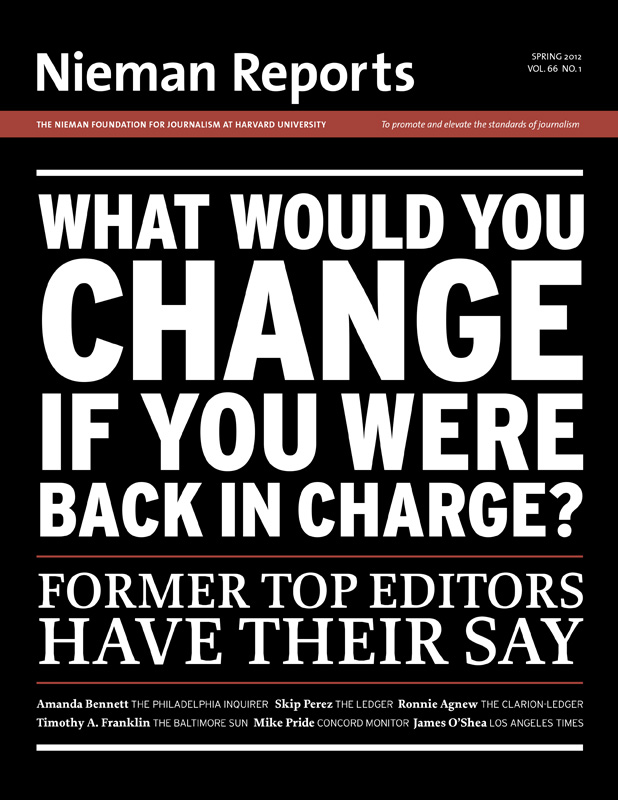I left the newspaper business this past August after 27 years, but I find that I'm consuming more news and information than ever—on multiple platforms—and that I'm increasingly defending an industry trapped between its glory days and uncertain future.
My reading takes me beyond my local newspaper to electronic versions of several national publications, including The New York Times and USA Today, the flagship of my former employer, Gannett, which owns The (Jackson, Miss.) Clarion-Ledger, where I spent nine years as executive editor and 18 months as managing editor.

Ronnie Agnew, former executive editor of The Clarion-Ledger, considers investigative reporting a top editorial priority. Photo by Melanie Thortis.
While newspapers are in a desperate race to find a new business model, the line of naysayers predicting their ultimate demise continues to grow. My advice to them: You're in for a long wait. But there's plenty of work to do to keep the naysayers at bay.
In my time away from the newsroom, my consumption of news has evolved into an intense desire for more depth in reporting. It would not be fair to criticize the industry without putting forth ideas that might help. So what do newspapers need to do to get their swagger back? How about the thoughtful and sophisticated inclusion of digital tools and social media and a return to what made them successful in the first place? Make me editor again and here's what I would do:
Maintain an investigative reporting culture. Strong reporting questioning authority, exposing corruption, and speaking for the powerless has led the way for many years in separating newspapers from their competitors. Any newspaper without strong investigative reporting is on the verge of becoming irrelevant. Yet many papers have misplaced priorities, devoting too much coverage to Lady Gaga and too little to local government.
Cover the community better than anyone else. Monitor what the competition doesn't provide. Unless the newspaper is a national one, local news is the primary reason people buy the paper.
Accept the fact that as more readers become comfortable with digital tools, circulation of the printed newspaper is likely to decrease. Newspapers need not be threatened by this. Provide the information readers want and watch them come.
Move faster and more nimbly into digital initiatives. Paywalls are just a start and should have become standard years ago, before staffs were cut and the public came to expect free as the norm. The successful newspaper must be disseminated any way the reader wants it. Social media tools must be embraced and used to enhance news reports, not replace them.
Lead the community through the newspaper's strong editorial voice. The opinion pages should provoke thought and generate passionate community discussion. Whether or not readers disagree with the views expressed, they do not want tepid opinion pages.
Eliminate home delivery of the Monday paper. Put the Monday paper on newsstands and reinvest the savings in lagging coverage areas.
Accept that the newsroom can no longer cover everything. Develop a list of franchise beats and make the commitment to own them. It's your town; act like it is.
Bring back training. Training budgets have been cut, but there are other ways to teach people. Bring in folks on the cheap. Do in-house seminars.
Find out what works on the Web for your market, and exploit it. Most newspapers toss the entire paper on the Web, instead of finding some specialties to build upon. If video is hot in your market, specialize in it on your site. If folks want nightlife information, feature it. If they want "good reads," that's what you should give them. You're dealing with a totally different audience on the Web; find out what that audience wants.
Get out of the office and get to know the town, what makes it tick, what makes it unique. Staff cuts are no reason to do journalism by phone. The town ought to know the newspaper is there and have respect for it, even when there are disagreements.
None of what I suggest would be considered cutting edge. Newspaper executives have become so consumed by the business side of the industry—and even I find it difficult to blame them—that some are losing sight of their commitment to the people at home, the ones they want to serve. The result is hundreds of underserved communities and public officials celebrating their newly discovered freedom as their conduct of the public's business too often goes uncovered.
A quality read, regardless of platform, will be the central element that will pump new life into the industry. Yet the exodus of seasoned news professionals has created a level of inexperience that has contributed to the decline, making it more difficult to do even the basic things that I suggest.
But my advice to my friends in newsrooms across America is you can quit, give up, or use the cutbacks as an excuse for a poor news product. Contrary to what many would have us believe, American communities have a huge appetite for news. Don't worry so much about how it is consumed. Focus on what you will give readers to consume.
Ronnie Agnew, executive director of Mississippi Public Broadcasting, is the former executive editor of The Clarion-Ledger in Jackson, Mississippi.
My reading takes me beyond my local newspaper to electronic versions of several national publications, including The New York Times and USA Today, the flagship of my former employer, Gannett, which owns The (Jackson, Miss.) Clarion-Ledger, where I spent nine years as executive editor and 18 months as managing editor.

Ronnie Agnew, former executive editor of The Clarion-Ledger, considers investigative reporting a top editorial priority. Photo by Melanie Thortis.
While newspapers are in a desperate race to find a new business model, the line of naysayers predicting their ultimate demise continues to grow. My advice to them: You're in for a long wait. But there's plenty of work to do to keep the naysayers at bay.
In my time away from the newsroom, my consumption of news has evolved into an intense desire for more depth in reporting. It would not be fair to criticize the industry without putting forth ideas that might help. So what do newspapers need to do to get their swagger back? How about the thoughtful and sophisticated inclusion of digital tools and social media and a return to what made them successful in the first place? Make me editor again and here's what I would do:
Maintain an investigative reporting culture. Strong reporting questioning authority, exposing corruption, and speaking for the powerless has led the way for many years in separating newspapers from their competitors. Any newspaper without strong investigative reporting is on the verge of becoming irrelevant. Yet many papers have misplaced priorities, devoting too much coverage to Lady Gaga and too little to local government.
Cover the community better than anyone else. Monitor what the competition doesn't provide. Unless the newspaper is a national one, local news is the primary reason people buy the paper.
Accept the fact that as more readers become comfortable with digital tools, circulation of the printed newspaper is likely to decrease. Newspapers need not be threatened by this. Provide the information readers want and watch them come.
Move faster and more nimbly into digital initiatives. Paywalls are just a start and should have become standard years ago, before staffs were cut and the public came to expect free as the norm. The successful newspaper must be disseminated any way the reader wants it. Social media tools must be embraced and used to enhance news reports, not replace them.
Lead the community through the newspaper's strong editorial voice. The opinion pages should provoke thought and generate passionate community discussion. Whether or not readers disagree with the views expressed, they do not want tepid opinion pages.
Eliminate home delivery of the Monday paper. Put the Monday paper on newsstands and reinvest the savings in lagging coverage areas.
Accept that the newsroom can no longer cover everything. Develop a list of franchise beats and make the commitment to own them. It's your town; act like it is.
Bring back training. Training budgets have been cut, but there are other ways to teach people. Bring in folks on the cheap. Do in-house seminars.
Find out what works on the Web for your market, and exploit it. Most newspapers toss the entire paper on the Web, instead of finding some specialties to build upon. If video is hot in your market, specialize in it on your site. If folks want nightlife information, feature it. If they want "good reads," that's what you should give them. You're dealing with a totally different audience on the Web; find out what that audience wants.
Get out of the office and get to know the town, what makes it tick, what makes it unique. Staff cuts are no reason to do journalism by phone. The town ought to know the newspaper is there and have respect for it, even when there are disagreements.
None of what I suggest would be considered cutting edge. Newspaper executives have become so consumed by the business side of the industry—and even I find it difficult to blame them—that some are losing sight of their commitment to the people at home, the ones they want to serve. The result is hundreds of underserved communities and public officials celebrating their newly discovered freedom as their conduct of the public's business too often goes uncovered.
A quality read, regardless of platform, will be the central element that will pump new life into the industry. Yet the exodus of seasoned news professionals has created a level of inexperience that has contributed to the decline, making it more difficult to do even the basic things that I suggest.
But my advice to my friends in newsrooms across America is you can quit, give up, or use the cutbacks as an excuse for a poor news product. Contrary to what many would have us believe, American communities have a huge appetite for news. Don't worry so much about how it is consumed. Focus on what you will give readers to consume.
Ronnie Agnew, executive director of Mississippi Public Broadcasting, is the former executive editor of The Clarion-Ledger in Jackson, Mississippi.



